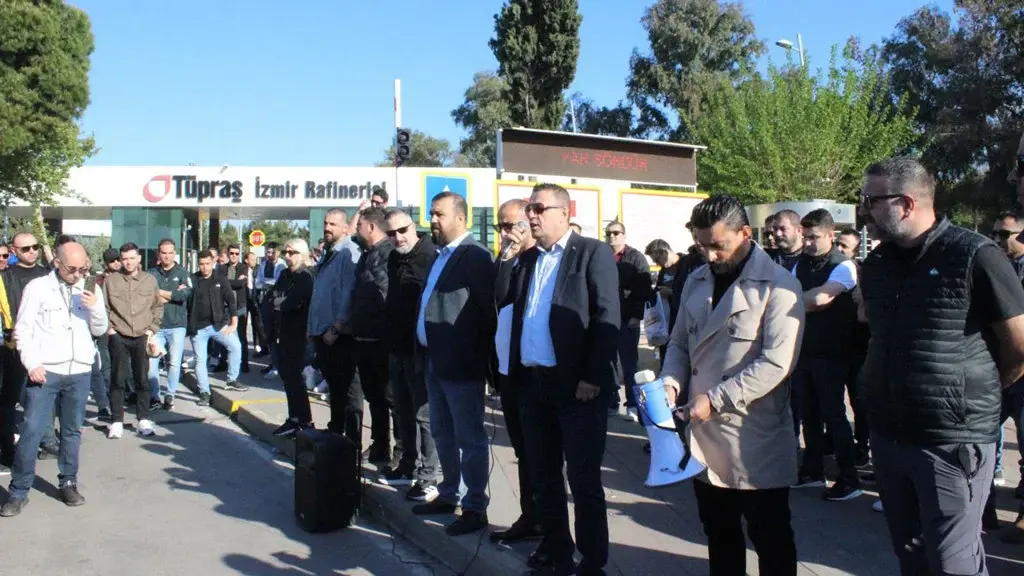A significant labor dispute has erupted in Turkey as approximately 3,500 workers at Tüpraş, the country’s largest oil refinery, initiated a work stoppage following unsuccessful negotiations over a collective bargaining agreement. The conflict, which encompasses workers across Tüpraş’s four refineries located in İzmir, Kocaeli, Batman, and Kırıkkale, highlights the tension between the labor union, Petrol-İş, and the refinery’s employer, Koç Holding. The work stoppage, described as a strategic move by union officials, underscores the growing frustration among workers regarding wage proposals and economic conditions.
| Article Subheadings |
|---|
| 1) Details of the Work Stoppage |
| 2) Breakdown of Negotiations |
| 3) Workers’ Demands |
| 4) Economic Context |
| 5) Background of Tüpraş |
Details of the Work Stoppage
The work stoppage at Tüpraş began in the early morning hours, specifically from 8:00 AM to 10:00 AM, affecting all four refinery locations. This coordinated action was sanctioned by the union’s headquarters and was met with a strong commitment from the workers to continue their fight for better wages and working conditions. Following the announcement, Hasan Toptan, the Petrol-İş Aliağa Branch Chair, addressed reporters outside the İzmir refinery, stating,
“We are at the point where negotiations end and our struggle has begun.”
His remarks underscores the resolve among the workers who feel that current conditions are unacceptable.
Breakdown of Negotiations
Negotiations between Tüpraş management, represented by Koç Holding, and the Petrol-İş union have been ongoing for several months, culminating in a failed agreement after 13 rounds of talks. Koç Holding’s proposal included a 28% wage increase for the first six months followed by an 18% increase for the subsequent six months, all within a three-year contract framework. Unions, however, deemed this offer as insufficient, citing the prevailing economic climate as a major factor for the rejection. Indeed, the workers have expressed clear discontent and demanded that the employer revisit their compensation proposals to reflect the current cost of living.
Workers’ Demands
The workers’ demands significantly exceed the employer’s offer. Specifically, they are seeking a two-year contract that includes a 71% wage increase during the first six months. Moreover, the workers are asking for a subsequent increase of 40% along with an additional 13% for following periods. This demand arises from the acute economic pressures workers currently face, influenced by rising living costs and inflation. Turan, a representative from the union, articulated their frustrations, claiming that employers were too often limiting wages in line with government-imposed minimum wage increases, thereby creating unrealistic ceilings for wage negotiations.
Economic Context
The economic climate in Turkey has been particularly challenging, marked by inflationary pressures that have significantly eroded purchasing power among the workforce. Workers have increasingly found it difficult to make ends meet as everyday expenses rise. In their statements, union representatives highlighted that the 28% and 18% wage increases proposed by Koç Holding failed to take into account the dire economic conditions. The claims made by workers reflect a broader narrative in Turkish society that wages often do not keep pace with inflation, worsening their already precarious financial situations.
Background of Tüpraş
Tüpraş, established in 1983, is the parent company of Turkey’s oil refining industry, formed through the merger of four state-owned refineries. It was privatized in 2006 when control was transferred to Koç Holding, which stands as Turkey’s largest business conglomerate. Over the years, Tüpraş has played a crucial role in the domestic energy landscape, but the recent labor unrest indicates that underlying tensions between labor conditions and corporate policies are becoming increasingly pronounced.
| No. | Key Points |
|---|---|
| 1 | 3,500 workers at Tüpraş initiated a work stoppage following failed negotiations. |
| 2 | Negotiations have been ongoing for several months but ended after 13 rounds without a resolution. |
| 3 | Workers are demanding a more significant wage increase than the one offered by the employer. |
| 4 | Economic conditions in Turkey have worsened, affecting workers’ ability to live comfortably. |
| 5 | Tüpraş has been integral to Turkey’s oil industry, yet labor disputes highlight growing worker dissatisfaction. |
Summary
The ongoing labor dispute at Tüpraş signifies a critical moment for workers advocating for their rights amid challenging economic conditions. The intense negotiations and subsequent work stoppage reflect a growing frustration among laborers who feel their compensation does not keep up with inflation. As this situation develops, the outcomes may have broader implications for labor relations and economic policies in Turkey.
Frequently Asked Questions
Question: What triggered the work stoppage at Tüpraş?
The work stoppage was triggered by failed negotiations between Koç Holding and the Petrol-İş union over a collective bargaining agreement, leading workers to initiate coordinated action for better wages.
Question: How many employees are involved in this labor dispute?
Approximately 3,500 workers across Tüpraş’s four refineries in İzmir, Kocaeli, Batman, and Kırıkkale are involved in the labor dispute.
Question: What are the main demands of the workers at Tüpraş?
Workers are demanding a two-year contract with a 71% wage increase for the first six months and additional increases for the following periods, citing the need for adjustments due to rising living costs.


